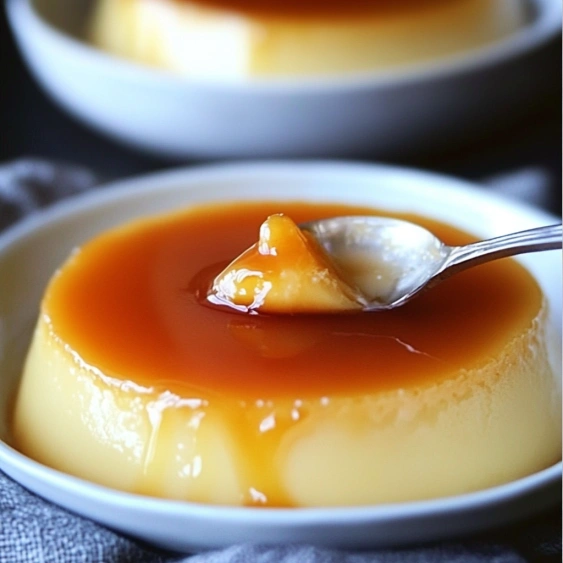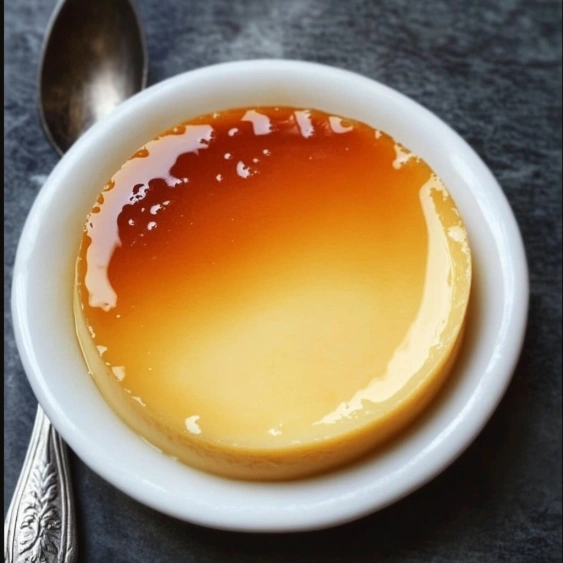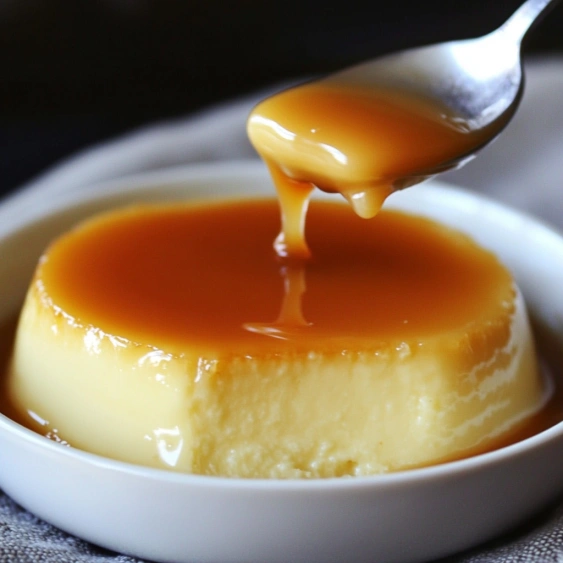 Pin it
Pin it
This creamy custard with a layer of glossy caramel creates the perfect balance of sweet and silky textures in each spoonful. The French classic Crème Caramel delivers restaurant-quality results with surprisingly simple ingredients from your kitchen.
I discovered this recipe during my culinary school days and have perfected it over dozens of dinner parties. The moment when you flip the ramekin and that amber caramel cascades down the sides still makes me smile every single time.
Ingredients
- Sugar: Divided for caramel and custard, brings the perfect level of sweetness without overwhelming the delicate egg flavor
- Whole milk: Creates the ideal richness without being too heavy, use full fat for best results
- Vanilla extract: Adds warmth and depth, choose pure extract rather than artificial for cleaner flavor
- Whole eggs and additional egg yolks: Provide structure and that signature silky texture, room temperature eggs work best here
- Boiling water: Helps transform crystallized sugar into flowing caramel and prevents hardening
Step-by-Step Instructions
- Prepare Your Equipment:
- Heat your oven to 275°F/140°C and thoroughly butter your ramekins to ensure easy unmolding later. Set up a baking dish large enough to hold all your ramekins for a water bath which will ensure gentle even cooking.
- Create The Caramel:
- Add sugar to a small nonstick pan and heat over medium heat without stirring. Watch carefully as the sugar melts and gradually turns amber, about 5 minutes. Once bubbling begins, immediately add the boiling water, standing back to avoid splatters. Pour this quickly into your prepared ramekins, dividing equally.
- Mix The Custard Base:
- Warm the milk with 1½ tablespoons sugar and vanilla extract in a saucepan until just below simmering point. Whisk whole eggs, egg yolks, and remaining sugar in a separate bowl until just combined, avoid creating air bubbles.
- Temper The Eggs:
- Gradually add the warm milk mixture to the egg mixture, whisking constantly to prevent scrambling. Pour through a fine mesh strainer to ensure silky smooth texture, then divide among the caramel lined ramekins.
- Bake In Water Bath:
- Place ramekins in your baking dish and fill with hot water reaching halfway up the sides of the ramekins. Bake for 35 to 40 minutes until the centers are just set but still have a slight wobble when gently shaken.
- Chill And Serve:
- Remove from water bath, cool completely, then refrigerate for at least 4 hours or overnight. To serve, run a thin knife around the edges, then invert onto a plate allowing the caramel to flow over the custard.
 Pin it
Pin it
The caramel transformation is my favorite part of this recipe. I still remember the first time I made this with my grandmother who taught me to listen for the gentle sizzle that indicates the sugar is reaching the perfect amber stage. That sound takes me back to her kitchen every single time.
Troubleshooting Caramel
Making caramel can intimidate even experienced cooks but a few simple techniques ensure success. Always use a light colored pan so you can see the color changing. Never stir the sugar while it melts as this can cause crystallization, instead gently swirl the pan. If the caramel hardens in your ramekins before you add the custard, do not worry it will liquify during baking.
Flavor Variations
While vanilla creates a classic flavor profile, this custard welcomes creative adaptations. Try infusing the warm milk with cinnamon sticks, star anise, or citrus zest for 30 minutes before straining and proceeding with the recipe. For coffee lovers, add a tablespoon of espresso powder to the milk. Coconut enthusiasts can replace half the milk with coconut milk for a tropical twist.
 Pin it
Pin it
Storage and Make Ahead Tips
These custards actually improve with a night in the refrigerator as the flavors meld and the caramel continues to soften. Cover each ramekin with plastic wrap after they have cooled completely and refrigerate for up to 3 days. Do not unmold until ready to serve as the caramel will gradually be absorbed into the custard changing its texture and appearance.
Serving Suggestions
Crème caramel shines in its beautiful simplicity but can be elevated with thoughtful accompaniments. A few fresh berries add color and bright flavor contrast. Crisp butter cookies provide textural balance against the silky custard. For special occasions, a light dusting of edible gold adds dramatic flair without overwhelming the delicate flavor.
Frequently Asked Questions
- → What's the difference between creme caramel and flan?
While very similar, creme caramel is typically made with whole milk and has a lighter texture, while flan often contains condensed or evaporated milk for a denser consistency. Regional variations exist, with flan being more common in Latin American cuisine and creme caramel in French culinary tradition.
- → Why is my caramel crystallizing?
Crystallization usually occurs when sugar crystals form on the side of the pan. To prevent this, avoid stirring once the sugar begins to melt, use a clean pan, and consider adding a small amount of lemon juice or corn syrup to inhibit crystal formation.
- → Can I make creme caramel without a water bath?
A water bath (bain-marie) is essential for creme caramel as it provides gentle, even heat that prevents the custard from curdling or developing a rubbery texture. The water insulates the custard from direct oven heat, allowing it to cook slowly and evenly.
- → How do I know when my creme caramel is properly set?
A perfectly set creme caramel should still have a slight wobble in the center when gently shaken. The edges should appear set, but the center should jiggle like firm jello. It will continue to set as it cools.
- → How far in advance can I make creme caramel?
Creme caramel actually improves with time as the caramel has more opportunity to infuse into the custard. You can make it up to 3 days ahead and keep it refrigerated in the ramekins. Just unmold right before serving.
- → What can I do with the leftover egg whites?
The leftover egg whites can be used to make meringues, pavlova, angel food cake, macarons, or added to an egg white omelet. They can also be frozen for up to 3 months in an airtight container for future use.
